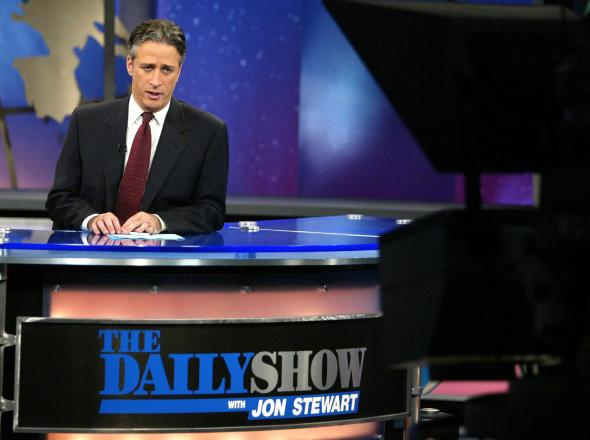The Evolution of Jon Stewart, in Nine Moments

Photo by Peter Kramer/Getty Images
Jon Stewart has guided viewers through several presidential elections, a number of national disasters, and countless Fox News gaffes. And through it all his persona has evolved from scrappy underdog to a cultural heavyweight who is essentially a part of the establishment he’d long mocked. So we charted the flashpoints in the development of Stewart’s moral comedy—from his first days on the air to last night’s farewell announcement.
January 1999: The very first episode
In his first day in the job following Craig Kilborn’s departure from The Daily Show, he could hardly have seemed more different from the Stewart we know today. He had a visible edge of nervousness and played the humor straight and snarky. His approach to the news felt more “Weekend Update” than the impassioned issues-based satire we now think of as Stewart-esque.
March 2000: The first anti-CNN rumblings
In this interview with Wolf Blitzer, we see the first rumblings of exasperation with the 24-hour news cycle—but his CNN digs are mostly playful and benign. On the early nomination victories for George Bush and Al Gore from their respective parties, Stewart asked Blitzer: “Are you thinking to yourselves, ‘Boy, we need another war’? Because with nothing to cover, we’ve got until November to fill this thing out. Is there any country maybe we can bomb, in your estimation?”
February 2001: Stewart discovers the perfect foil in George W. Bush
Needless to say, W became a punch line for pretty much every political comedian throughout the early ’00s. But Stewart’s unrelenting shots at the president helped shape his sense of mission early on. In this clip, Stewart and then-correspondent Stephen Colbert go hard at Bush’s “everyman” image and ineffectual leadership: “Jon, what do you have against the president?” Colbert asks. “Everyone likes him but you. You’re really stepping on the country’s Bush buzz.”
September 2001: After 9/11, The Daily Show learns to emotionally connect
More than a week after the World Trade Center attacks, Stewart returned to his desk. “It’s another entertainment show beginning with an overwrought speech of a shaken host, and television is nothing if not redundant,” he said, solemnly. “So I apologize for that.” Yet the familiarity of the moment did nothing to dull the real emotional connection he forged with viewers that night as he struggled openly with the question of whether it was too soon for comedy in light of what had transpired. The monologue paved the way for viewers to seek out Stewart in other times of grave distress, from the Boston Marathon bombing to the Charlie Hebdo attacks.
April 2003: With Baghdad’s liberation, some moral nuance
The day of Baghdad’s liberation, Stewart addressed those who couldn’t reconcile the joy of seeing Iraqis celebrate with their personal disappointment about the U.S.’s decision to use force: “Leave the room now,” he said. Despite being one of the earliest vocal detractors of the Iraq War, Stewart was often at his best when embracing nuance. That night he made the case that the “ideological left” and “ideological right” were both wrong in how they viewed the current events—and made the case that things are never so black and white.
October 2010: With The Rally to Restore Sanity and/or Fear, Stewart is suddenly maybe not a comedian at all
Stewart and Stephen Colbert’s satirical response to Glenn Beck’s “Restoring Honor” event was this rally, which brought thousands of people to the National Mall. At the conclusion, Stewart gave a speech that was heavier on rhetoric than it was on jokes, as he called for politicians and the media to limit hyperbole and make the distinction between, for instance, “real racists and Tea Partiers.” For many, this was the moment that tipped his act from comedy into ideology.
December 2010: Demagoguery over the 9/11 health care bill
After the Rally, things escalated quickly. In 2010, when Senate Republicans blocked a bill providing medical benefits to 9/11 first responders, Stewart effectively crossed over into full-on political advocacy. In two separate segments, he slammed the party for being “cowardly” after years of co-opting the tragic event for political gain, and cable news networks for largely ignoring the issue. As Christopher Beam wrote in Slate, “by shaming [Republicans] in the name of 9/11 workers, he was engaging in demagoguery himself. It may have been for a good cause, but it was political demagoguery all the same.”
August 2014: Ferguson prompts the rant to end all rants
After the shooting of Michael Brown and the ensuing protests in Ferguson, Stewart sounded off on the media’s handling of the events. This is Stewart as we’ve known him for some time now—energetic (he can barely contain himself at his desk), fast-talking, and direct. He addresses the media directly: “Do you not understand that life in this country is inherently different for white people and black people?” He ends the 10-minute segment with a story about one of his own correspondents, a black male, who was racially profiled by a security guard while on the job—a sobering and effective end for his speech.
February 2015: A restless Stewart announces his departure
“This show doesn’t deserve an even slightly restless host, and neither do you,” Stewart told his audience. He’d been on the show for seventeen years; by this point, the restlessness was palpable. The goofy sense of absurdity that animated him at the start had hardened into something that barely looked like satire at all. So as much as TV will miss him, it makes sense that he decided it was time for his Daily Show reign to end.
